| 1. Converging Regions: Global perspectives on Asia and the middle East / Edited By: Nele Lenze , Charlotte Schriwer.England: Ashgate, 2014 |
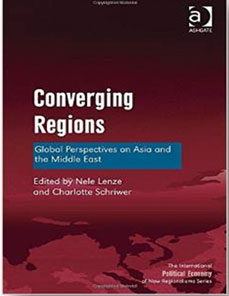 |
Abstract: The current volume examines this renewed global dynamic, and how it is changing the relationships between the interdependent global communities across Asia and the Middle East. Focussing on the broader aspects of finance and trade between the Middle East and Asia, as well as growing security issues over natural resources and questions of sovereignty, this volume concludes with speculations on the growing importance of Asia and the Middle East in the global setting. |
|
2. Countering Global Terrorism and Insurgency: Calculating the Risk of State Failure in Afghanistan, Pakistan and Iraq / Natasha Underhill.New York: Palgrave Macmillan, 2014
|
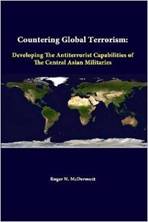 |
Abstract: It focuses on the current trend of religious extremism as a means of understanding and re-thinking the debates around the connections between terrorism and insurgency and state failure. Using the case studies of Pakistan, Afghanistan and Iraq it examines the underlying causes and conditions necessary for terrorism and insurgency to occur, while countering the common perception that state failure is the central cause. Underhill presents a better understanding of the concepts of terrorism, insurgency and state failure on an individual and comparative level, and analyses more deeply the underlying issues affecting the world's most active terrorist and insurgent hotspots: Pakistan, Afghanistan and Iraq.h |
| 3. Cross LOC: Confidence building measures in India and Pakistan /Delhi: Gaurav Books Centre, 2015 |
 |
Abstract: The term Line of Control (LoC) known as Asia’s Berlin wall, refers to the military control line between the Indian and Pakistani-controlled parts of the former princely state of Jammu and Kashmir—a line which, to this day, does not constitute a legally recognized international boundary but is the de facto border. Originally known as the “Cease-fire Line”, it was redesignated as the “Line of Control” following the Simla Agreement, which was signed on 3 July 1972. |
| 4. Cuba in a Global Context: International Relations, Internationalism, and Transnationalism / Edited by Catherine Krull USA: University Press of Florida, 2014 |
 |
Abstract: There is a great deal more to Cubas place on the global stage than its contentious relationship with the United States. Taking a refreshing look at Cuban international relations, contributors to this volume from both inside and outside the island explore the myriad ways in which it has not only maintained but often increased its reach and influence. In Latin America, Europe, Africa, and Asia, Cuba has assumed a geopolitical role of unlikely prominence. Even in the face of the ongoing U. S. embargo, Cubans have seen improvement in the quality of their lives. Shedding new light on Cuban diplomacy with communist China as well as with Western governments such as Great Britain and Canada, these essays reveal how the promotion of increased economic and political cooperation between Cuba and Venezuela served as a catalyst for the Petrocaribe group |
| 5. Decolonizing Palestinian Political Economy: De-development and Beyond/ Edited by Mandy Turner and Omar Shweiki New York: Palgrave Macmillan, 2014 |
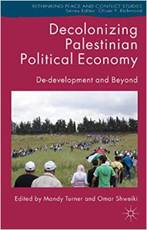 |
Abstract: It rejects the dominant, conventional approach that has fragmented the Palestinians into separate and distinct groups (some thereafter named as 'Arab-Israeli', 'Bedouin', etc.), and which has reduced those regarded as 'the Palestinian people' to only those who reside within the occupied territory. The book challenges this intellectual fragmentation by reuniting Palestinians in one historical political-economy narrative of a people experiencing a common process of dispossession, disenfranchisement and disarticulation. It is a must-read for scholars, students and activists who wish to understand the historical origins and contemporary realities that face Palestinians.
|
| 6. Delhi dialogue V India Asean: vision for partnership and prosperity / Ed by Rajiv K. Bhatia ect. Delhi: Shipra Punlication, 2014 |
 |
Abstract: This book, originating from the proceedings of the Delhi Dialogue V, seeks to highlight India's increasing engagement with ASEAN countries and explores the agenda for consolidation of their relationship in the coming years. It draws from the knowledge and insights from political and economic leaders, officials, academics and opinion-makers of India and ASEAN countries to find out ways to intensify and broaden political, strategic, economic and civil society interaction between the two regions. In the wake of Delhi Dialogue being mentioned in the Vision Statement issued at India-ASEAN Commemorative Summit in December 2012, this book holds particular importance. It also assesses and incorporates issues and perspectives which emerged from this Summit to help identify areas of greater engagement between India and ASEAN countries. It is hoped that this volume will make a significant contribution towards the ever expanding scholarship on India-ASEAN relationship.
|
| 7. Democracy, Revolution and Geopolitics in Latin America: Venezuela and the International Politics of Discontent/ Edited by Luis Fernando, Angosto-Ferrández New York: Routledge, 2013 |
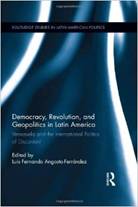 |
Abstract: This edited volume first contextualizes and explains the results of the last re-election of Hugo Chávez in terms of its geopolitical conditionings and implications. Contributors tackle Latin American geopolitics by analyzing Venezuelan foreign policy and the country's role in continental projects of supra-national integration. Contributors also examine electoral strategy and tactics in order to show how the two main candidates built their campaign on emotional grounds as much on rational ones. This will be connected to the investigation of new narratives of national identification in contemporary Venezuela and how they may have practical implications in the design of policies addressing issues such as indigenous rights, community media and national security. |
| 8. Democratic Participation in Armed Conflict: Military Involvement in Kosovo, Afghanistan, and Iraq / Patrick A. Mell New York: Palgrave Macmillan, 2014 |
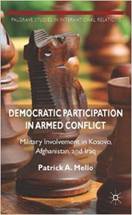 |
Abstract: When do democracies participate in military operations, and under which conditions do they abstain? Studies on the democratic peace have largely neglected the flipside of democratic participation in armed conflict. Moreover, whilst scholars have made the case that democracy needs to be unpacked to be meaningful, this is rarely done in international relations. In comparative politics, on the other hand, there has been extensive research on democratic subtypes and their virtues and weaknesses, but this is seldom applied to security policy. |
| 9. Democratization in China, Korea and Southeast Asia?: Local and National Perspectives / Edited by Kate Xiao Zhou, Shelley Rigger, Lynn T. White III New York: Routledge, 2014 |
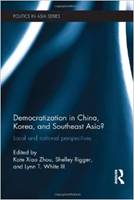 |
Abstract: Rapid economic pluralization in East Asia has empowered local and medial groups, and with this change comes the need to rethink usual notions regarding ways in which "democracies" emerge or "citizens" gain more power. Careful examination of current developments in China, Korea, and Southeast Asia show a need for expansion of our understandings of democracy and democratization. This book challenges traditional ways in which political regimes in local as well as national polities are conceived and labeled. It shows from Asian experiences that democracy and its precursors come in more forms than most liberals have yet imagined. driving political change in the People’s Republic, and it finds both accelerators and brakes in China’s political reform process. |
| 10. The destruction of Hyderabad / A.G. Noorani. London: Hurst & Company, 2014 |
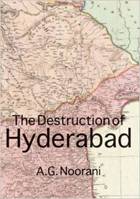 |
Abstract: The fascinating story of the fall of the Indian princely state of Hyderabad has till now been dominated by the 'court historians' of Indian nationalism. In this book A. G. Noorani offers a revisionist account of the Indian Army's 'police action' against the armed forcesand government of Hyderabad, ruled by the fabulously wealthy Nizam. |
| 11. Development, poverty and power in Pakistan: the impact of state and donor interventions on farmers / Syed Mohammad Ali London: Routledge, 2015 |
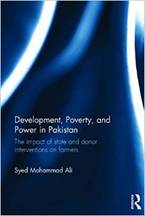 |
Abstract: The book provides an in-depth exploration of the combined impact of state and donor interventions, as well as that of resistance attempts, to alter the status quo within Pakistan. It questions the relevance of state institutions and policies contending with the problems of farmers in Pakistan, and how donor-led policies and programmes also influence their lives. It draws on findings that have emerged from interviews of over 200 respondents including government officials, donor agency representatives and different categories of poor farmers, during eleven months of fieldwork in the provinces of Sindh and Punjab. This research reveals some divergences between state and donor policies, but it finds more prominent convergences, which in turn enable the landed rural elite to benefit from market-based and capital-intensive processes of agricultural growth, without offering substantial opportunities for poor farmers. |
| 12. Deviance in International Relations: 'Rogue States' and International Security / Edited by Wolfgang Wagner,Wouter Werner, Michal Onderco.New York: Palgrave Macmillan, 2014 |
 |
Abstract: 'Rogue states' have been high on the international security agenda for many years but their theoretical significance for International Relations has remained poorly understood. In contrast to the bulk of writings on 'rogue states' that address them merely as a policy challenge, this book focuses on what we can learn from deviance about the international system and international society. |
| 13. Digital diplomacy: conversations on innovation in foreign policy / Andreas Sandre. Lanham: Rowman & Littlefield Publisher, 2015 |
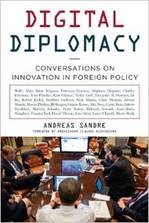 |
Abstract: This highly informative book is an important contribution to the growing discussion and study of the intersection between technology and diplomacy. -- Jian Wang, Director of the USC Center on Public Diplomacy Throw the old diplomatic rule books out! Andreas Sandre explains how digital diplomacy is impacting and changing traditional diplomatic channels. Digital Diplomacy presents new challenges for diplomats and governments to overcome, and at the same time fuels innovative government efforts to listen to and engage with citizens that have too often been left out of the process. If you want to better understand the intersection of digital and traditional diplomacy this is the book to read. -- Joe Trippi, author of The Revolution Will Not Be Televised: Democracy, the Internet, and the Overthrow of Everything The impact of social media on diplomacy has been all encompassing. It has changed the way governments communicate their messages, interact with each other, influence opinion and stakeholders, and the expectations the public has in an open, constantly changing and connected world. The very idea of who and what matters is altered.
|
| 14. Dirty Assets: Emerging Issues in the Regulation of Criminal and Terrorist Assets / Edited by Colin King, Clivl Walker. USA: Ashgate, 2104 |
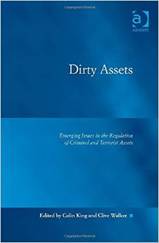 |
Abstract: Adopting a multi-disciplinary and comparative approach, this book focuses on the emerging and innovative aspects of attempts to target the accumulated assets of those engaged in criminal and terrorist activity, organized crime and corruption. It examines the 'follow-the-money' approach and explores the nature of criminal, civil and regulatory responses used to attack the financial assets of those engaged in financial crime in order to deter and disrupt future criminal activity as well as terrorism networks. With contributions from leading international academics and practitioners in the fields of law, economics, financial management, criminology, sociology and political science |
| 15. The disempowered development of Tibet in China: a study in the economics of Marginalization / Andrew Martin Fischer.Lanham: Lexington Books, 2014 |
 |
Abstract: The combination of these disempowering dynamics with the sheer speed of dislocating and disembedding social change provides important insights into recent tensions given that it has accentuated insecurity while restricting the ability of Tibetan communities to adapt in autonomous and self-determined ways. The study represents one of the only macro-level and systemic analyses of its kind in the scholarship on Tibet, based on accessible economic analysis and extensive interdisciplinary fieldwork. It also carries much interest for those interested in China and in the interactions between development, inequality, exclusion and conflict more generally. |
| 16. Disrupting Territories: Land, Co modification & Conflict in Sudan/ Edited by Jörg Gertel, Richard Rottenburg, Sandra calkins. New York: James Currey, 2014 |
 |
Abstract: This book seeks to disentangle the emerging relationships between people and land in Sudan. The first part focuses on the spatial impact of resource-extracting economies: foreign agricultural land acquisitions; Chinese investments in oil production; and competition between artisanal and industrial gold mining. |
| 17. Dividing Boundaries Contours of Indo- China Conflict / Anil. K. Saxena New Delhi: Gaurav Books Centre, 2015 |
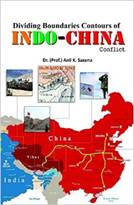 |
|
| 18. Drone warfare / John Kaag and Sarah Kreps. UK: Polity, 2014 |
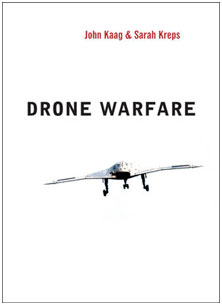 |
Abstract: One of the most significant and controversial developments in contemporary warfare is the use of unmanned aerial vehicles, commonly referred to as drones. In the last decade, US drone strikes have more than doubled and their deployment is transforming the way wars are fought across the globe. But how did drones claim such an important role in modern military planning? And how are they changing military strategy and the ethics of war and peace? What standards might effectively limit their use? Should there even be a limit? |
| 19. The Globalization of Chinese Propaganda: International power and Domestic political cohesion / Kingsley Edney.New York: Palgrave Macmillan, 2014 |
 |
Abstract: This book examines the Chinese propaganda system in the era of globalization, exploring connections between the Chinese Communist Party's desire for domestic political control and its vision for the development of China's international power. Investigating areas such as Chinese attitudes to soft power, the recent international expansion of the Chinese media, and the authorities' reaction to public opinion crises at home and abroad, Edney shows that in order to understand Chinese attempts to influence international views it is necessary to examine the power of propaganda in China's domestic political system. |
| 20. The dynamics of ASEAN cooperation and China - ASEAN relations / Wang Yuzhu. Paths International Ltd, 2014 |
 |
Abstract: A detailed examination of the hugely significant relationship between China and the ASEAN countries from a Chinese perspective. This book provides a detailed analysis of the Association of Southeast Asian Nations (ASEAN) and the deepening relationship that ASEAN has with China. As an organization for regional cooperation among developing countries, ASEAN has drawn attention from the region and even the world, and is playing an increasingly important role in international affairs. As East Asian cooperation deepened in the 21st century, ASEAN countries not only raised the idea of building a community based on the pillars of an economic community, a political-security community and a socio-cultural community, but also issued the ASEAN Charter. |
| 21. The Economic and Legal Effectiveness of the European Union's Anti-Money Laundering Policy / Brigitte Unger and Joras Ferwerda and others... USA: Edward Elgar Pub, 2014 |
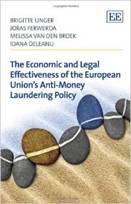 |
Abstract: The analysis includes an inquiry into the national supervisory architectures, a comparison of the definitions of money laundering used in practice, a breakdown of the role of Financial Intelligence Units and a cost - benefit analysis of anti-money laundering policy. Skilfully assessing the economic and legal effectiveness of anti-money laundering efforts in the EU, this comprehensive study will appeal to students, scholars and practitioners working in economics, banking, finance and law. |
| 22. Economic Growth and Development in Africa: Understanding trends and prospects / Horman Chitong New York: Routledge, 2015 |
 |
Abstract: Bringing in perspectives from African intellectuals and scholars, many of whom have previously been overlooked in this debate, the book examines the construction of Africa’s economic growth and development portraits over the years. It looks at two institutions that play a vital role in African development, providing a detailed explanation of how the World Bank and the IMF have interpreted and dealt with the African challenges and experiences. The insightful analysis reveals that if Africa is rising, only 20-30 per cent of Africans are aboard the rising ship, and the main challenge facing the continent today is to bring on board the majority of Africans who have been excluded from growth. |
| 23. Economic, social, and cultural rights in international law: contemporary issues and challenges / Eibe Riedel, etc, Ed. UK: Oxford University Press, 2014 |
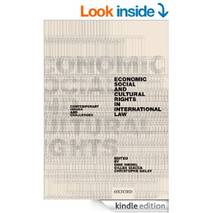 |
Abstract: This book assesses how effective efforts have been to realize international ESC rights, investigating the contemporary challenges obstructing their protection. It investigates the impact of the global financial crisis, the need for ESC rights to be implemented in a non-discriminatory manner, and the interrelationship between ESC rights and other international legal regimes |
| 24. Economics for the curious: inside the minds of 12 nobel laureates / Robert M. Solow and Janice Murray Ed.UK: Palgrave Macmillan, 2014 |
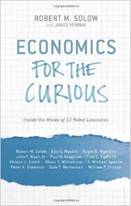 |
Abstract: Alfred Marshall, the founder of modern economics, once described economics as 'the study of mankind in the ordinary business of earning a living'. In Economics for the Curious, 12 Nobel Laureates show that 'the ordinary business of earning a living' covers a wide range of activities, as they take readers on an engaging tour of some of the everyday issues that can be explored using basic economic principles. |
| 25. Elections and Democratization in the Middle East: The Tenacious Search for Freedom, Justice, and Dignity / Edited by Mahmoud Hamad, Khalil al-Anani.New York: Palgrave Macmillan, 2014 |
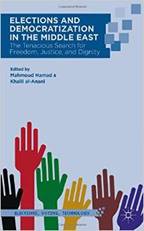 |
Abstract: For decades, elections in many parts of the Middle East were a forgone conclusion. They came and went with little fanfare as many knew that results were predetermined in the offices and corners of state security buildings in Cairo, Damascus, Tehran, and Tunisia. No wonder that most citizens did not care to participate or take part in such theatrical displays. The Arab uprisings that toppled entrenched autocrats have changed this. Voters flocked to the polls to cast their votes and choose their rulers. This book explores the dynamics of elections in the Middle East and their impact on democratization processes. It combines overview chapters with individual studies of Tunisia, Egypt, Libya, Morocco, Yemen, Iraq, Iran, and Turkey. |
| 26. Enabling the Iranian Gas Export Options: The Destiny of Iranian Energy Relations in a Tripolar Struggle over Energy Security and geopolitics/ Maximilian Kuhn.Berlin: Springer VC, 2014 |
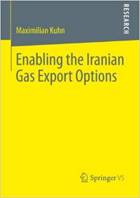 |
Abstract: Maximilian Kuhn investigates one of the most pressing, yet neglected subjects in the field of global energy politics: the integration of the Iranian gas market. Possessing the world’s second-largest proven natural gas reserves, Iran is a hypothetical energy giant-in-waiting. Yet over three decades of internal divisions, coupled with crippling international sanctions, have left Iran unable to capitalize on its vast energy potential. Increasing global demand for natural gas and a government in constant need of finding new sources of revenue to meet the needs of a fast-growing population should lead Iran to eventually become a large-scale gas exporter. How this could take place and what the implications for global gas markets would be are the central research questions tackled by this study. |
| 27. Energy Poverty: Global challenges and local solutions / Edited by: Antoine Halff; Benjamin K Sovacool; Jon Rozhon.UK: Oxford University Press, 2014 |
 |
Abstract: The remaining chapters mostly provide examples of large-scale initiatives and specific projects that are likely to be of interest to those seeking more practical advice or case study examples, such as rural energy development in Nepal, or the joint International Finance Corporation-World Bank ‘Lighting Africa’ programme, aiming to provide modern off-grid lighting products to 250 million people in Africa by 2030. |
| 28. The engagement of India: strategies and responses/ Ed by Ian Hall.New Delhi: Foundation Books, 2014 |
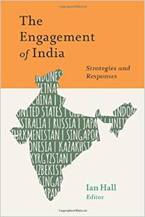 |
Abstract: India’s rise has changed the nature of its relationships with other major players in the Asia-Pacific region. In response, regional states and great powers have moved to “engage” India. But what does “engagement” involve? And which “engagement strategies” – diplomatic, military, economic or public – have worked and which have not? Finally, what do the “engagement of India” tell us about India’s place in world politics and the best means by which it and others can manage its rise?This book explores the various engagement strategies employed by key international actors, including those used by United States, Japan, Russia and China, as well as the responses these strategies have prompted from India in both its foreign and domestic policies. It draws upon a growing body of theoretical literature that explores the nature and utility of engagement in international relations, and employs it to make better sense of India’s rise, its causes and its consequences. |
| 29. The EU, the US and global climate governance / Ed by Christine Bakker and Francesco Francioni. England: Ashgate, 2014 |
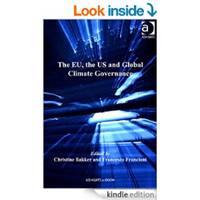 |
Abstract: This book provides an innovative analysis on policy measures taken by the EU and the US in several areas relating to climate change and, as such, fills a gap in our understanding of this topical subject. It adopts a multidisciplinary approach, thus including insightful contributions from leading and highly respected authors in the fields of political science, economics and law. The book is a must for practitioners and academics. |
| 30. Commission's The European Energy and Climate Policy: A Climate for Expertise? / Jonas Dreger. New York: Palgrave Macmillan, 2014 |
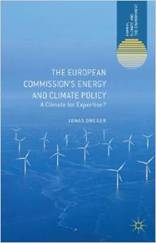 |
Abstract: This book is the first analysis of the development of the emission trading scheme and the 2008 energy and climate package by the European Commission. The author offers a deep insight into the genesis of the Commission's proposal for the emission trading scheme, its revision and the new proposal for a renewable energy directive. He traces the development of the world's first comprehensive energy and climate legislation within the Commission services and the negotiations between commissioners and their cabinets. Focusing on the role of politics and science within the Commission this study tackles the following questions: what are the Commission strategies in using knowledge? Does the Commission actually learn or does it simply engage in power plays when confronted with knowledge? According to the author, the Commission is built on a paradox and functions as catalyst transforming knowledge into politics. |
|
31. The European Union and India: rhetoric or meaningful partnership? / Pacaline Wigand etc. UK: Edward Elgar, 2015
|
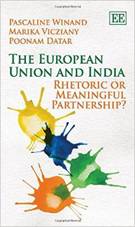 |
Abstract: This comparative book will appeal to academics, students and policy-makers with an interest in international politics and public policy, economic development and business, Asian studies and European studies. |
| 32. The European Union as a Diplomatic Actor/ Edited by Joachim Koops, Gjovalin Macaj. New York: Palgrave Macmillan, 2014 |
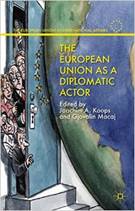 |
Abstract: This pioneering overview of the European Union's (EU's) hybrid and multi-level system of diplomacy is written for and by scholars as well as practitioners. Covering EU representation in a broad range of world regions, international forums and burning issue areas, the contributions not only analyse in depth the challenges facing EU diplomacy, but also offer useful suggestions for future improvements. Christer Jonsson, Professor Emeritus, Lund University, Sweden 'Relatively little is known about the processes, policies and outcomes of the EU's diplomatic action. This volume is a worthy attempt to address these lacunae. Contributions from seasoned academics and practitioners ensure its relevance and timeliness across an engaging selection of foreign policy fields. For anyone interested in the scope, nature and impact of the EU in the world, this is a 'must-read.
|
| 33. The Eurozone Crisis and the Transformation of EU Governance: internal and external implications / Edited by Maria Jo? Rodrigues and Eleni Xia rchogiannopoulou. England: Ashgate, 2014 |
 |
Abstract: The transformation of European economic governance with contributions by Fabbrini, Stoffas, Collignon, Eising, Rasch and Rozbicka.III. The transformation of European social policy governance with Goetschy, Hemerijck, de la Porte and Heins.IV. The international implication of the transformation of EU governance highlighted by Rodrigues, Xiarchogiannopoulou and Mgge. |
| 34. The evolution of India's Israel policy: continuity, change, and compromise since 1922 / Nicolas Blarel. New Delhi: Oxford University Press, 2015 |
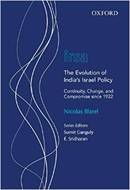 |
Abstract: India's relationship with Israel has been one of the most sensitive and controversial issues in New Delhi's diplomatic history. India first decided to recognize Israel in 1950 but deliberately deferred the establishment of diplomatic relations. Then, in January 1992, New Delhi abruptly modified its no-relationship policy and exchanged diplomatic missions with Tel Aviv. In the spate of only two decades, the two countries have developed significant economic and especially defense relations. Why did India only decide to establish diplomatic relations with Israel in 1992? And how have Indo-Israeli relations moved from almost naught to a rapid and substantial development in certain sensitive sectors like defense cooperation in only a few years? |
| 35. Evolution of international environmental regimes: the case of climate change / Simone Schiele.UK: Cambridge University Press, 2014 |
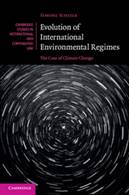 |
Abstract: Drawing specifically on the international climate regime, Simone Schiele examines international environmental regimes from a legal perspective and analyses a core feature of international regimes – their ability to evolve over time. In particular, she develops a theoretical framework based on general international law which allows for a thorough examination of the understanding of international law and the options for law-creation in international environmental regimes. The analysis therefore provides both a coherent understanding of the international climate regime and a starting point for further research in other regimes. |
| 36. Failed states and the origins of violence: a comparative analysis of state failure as a root cause of terrorism and political violence/ Tiffiany Howard. USA: University of Nevada,, 2014 |
 |
Abstract: What makes a terrorist? Is an individual inherently predisposed to be attracted to political violence or does exposure to a certain environment desensitize them in such a way that violence represents a viable mode for addressing political grievances? Identifying state failure as the impetus for political violence this book addresses these questions and focuses on why existing extremist groups find failed states so attractive.Utilizing global barometer data, Tiffiany Howard examines the underpinnings of individual support for political violence and argues that an insidious pattern of deprivation within failed states drives ordinary citizens to engage in and support extreme acts of political violence. |
| 37. The future of intelligence: challenges in the 21st century / Isabelle Duyvesteyn etc Ed. London: Routledge, 2014 |
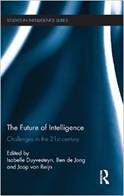 |
Abstract: The main focus of Western intelligence services is no longer on the intentions and capabilities of the Soviet Union and its allies. Instead, at present, there is a plethora of threats and problems that deserve attention. Some of these problems are short-term and potentially acute, such as terrorism. Others, such as the exhaustion of natural resources, are longer-term and by nature often more difficult to foresee in their implications. |
| 38. Future oil demands of China, India, and Japan: policy scenarios and implications/ George G. Eberlin Lexington Books: Lanham, 2014 |
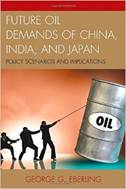 |
Abstract: Future Oil Demands of China, India, and Japan examines how Chinese oil energy will likely shape future Sino-Indian and Sino-Japanese relations under conditions of dependency and non-dependency, and whether competition or cooperation for scarce energy resources will result. The author lists and describes three possible Chinese oil energy futures or scenarios (Competitive Dependency, Competitive Surplus, and Cooperative Surplus) using Scenario Analysis and the PRINCE Method to subsequently estimate their associated likelihoods. Further, this book discusses and evaluates their strategic implications for India and Japan and estimates the most likely oil energy future. |
| 39. Global cities and climate change: the translocal relations of environmental governance / Taedong Lee. London: Routledge, 2015 |
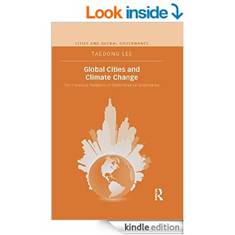 |
Abstract: Cities have led the way to combat climate change by planning and implementing climate mitigation and adaptation policies. These local efforts go beyond national boundaries. Cities are forming transnational networks to enhance their understandings and practices for climate policies. In contrast to national governments that have numerous obstacles to cope with global climate change in the international and national level, cities have become significant international actors in the field of international relations and environmental governance.
|
| 40. Global diasporas and development: socioeconomic, cultural, and policy perspectives / Sadananda Sahoo and B.K.Pattanaik Ed. New Delhi: Springer, 2014 |
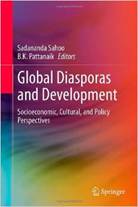 |
Abstract: This volume discusses how diasporas have evolved and engaged in economic, social and cultural domains of their host and home countries across the globe. The volume is divided into six parts:Issues, Challenges and Development Experiences; Diaspora Finance and Economic Development; Knowledge Transfer and Diasporas; The Politics of Inclusion and Exclusion; Gender and Diasporas; and Representation in Film, Theatre and Literature. It is truly a global representation of diasporic engagement. Its contributions come from experts in various disciplines across the globe, and the chapters cover socioeconomic, policy-related and cultural elements in countries as far apart as New Zealand and Zimbabwe. |
| 41. Global economic crisis and the politics of diversity / Yildiz Atasoy Ed. New York: Palagrave Macmillan, 2014 |
 |
Abstract: An interdisciplinary group of scholars from the global North and South critically explore the global deepening of market economy models. In case studies including Asia, the Middle East and Latin America, they examine the associated tensions of livelihood and ecology in the current context of global economic crisis, considering issues of natural ecology, water use, health, childcare, technology and work, migration, and economic growth.
|
| 42. Global Finance and Development / David Hudson. New York: Routledge, 2014 |
 |
Abstract: The question of money, how to provide it, and how to acquire it where needed is axiomatic to development. The realities of global poverty and the inequalities between the ‘haves’ and the ‘have-nots’ are clear and well documented, and the gaps between world’s richest and the world’s poorest are ever-increasing. But, even though funding development is assumed to be key, the relationship between finance and development is contested and complex.
|
| 43. The Global Rise of Asian Transformation: Trends and developments in economic growth dynamics / Pongsak Hoontrakul and Christopher Balding. New York: Palgrave Macmillan, 2014 |
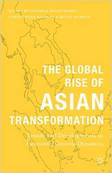 |
Abstract: Asian countries are catching up with the West by transforming their primarily agrarian societies into industrial power houses. Manufacturing is driving innovation, productivity growth, and higher standards of living for billions of Asians. In the colonial past, the Asian production and supply chains served Western consumers. The world is now poised to evolve, led by a unified Asian business landscape capable of driving sustainable global growth within industries and markets. |
| 44. Global security watch: Saudi Arabia / Matthew Gray. Califonia: Praeger, 2014 |
 |
Abstract: This possessor of a quarter of the world's oil reserves and host to two of the holiest cities in Islam, Saudi Arabia is an integral part of the cultural, economic, and political well-being of the Middle East. From Persian Gulf security, to Middle Eastern politics, to the international energy industry, events in this desert kingdom strongly impact the stability of the region. This comprehensive resource analyzes contemporary Saudi Arabia-its modern history, the role of Islam, and the nature of Saudi foreign relations-and reveals how these and other factors dictate and shape the country's current security policies and priorities. |
| 45. Globalization revisited / Grahame Thompson. London: Routledge, 2015 |
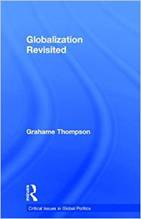 |
Abstract: Written by one of the leading scholars of global politics, Globalization Revisited is a major new book for students of globalization. It describes and explains the challenges to liberalism and the global order as result of globalizing forces – from financial interconnectedness to the growth of religious fundamentalisms. |
| 46. Globalization: The Paradox of Organizational Behavior: Terrorism Foreign Policy, and Governanc / Meshack M. Sagini UK: University Press of America, 2015 |
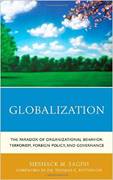 |
Abstract: Globalization: The Paradox of Organizational Behavior is an excellent resource for undergraduate and graduate students, professors, policy makers, and the intelligentsia worldwide. Sagini explores the text's major themes using historical, materialistic, and imperialistic factors. The globalization movement is shaped by economic, political, technological, and cultural forces that transform human collectivities. Instability and related concomitant Hissues such as disease, energy security, and terrorism challenge the reconstructive role of internal and external factors in foreign policy decision-making. |
| 47. Globalizing geographies: perspectives from Eurasia / Ed by Anita Sengupta & Suchandana Chatterjee. New Delhi: KW Publication, 2015 |
 |
Abstract: This volume examines the Eurasian engagement with geographies of globalization through an understanding of the intersection of space and place in Eurasia, Eurasian encounters with globalization in terms of shifting spheres in politics, economics and culture, levels of integration and the intricate patterns of roads and routes. It also takes note of challenges encountered by social groups and communities in the face of globalizing tendencies. |
| 48. Governance, conflict and development in South Asia: erspectives from India, Nepal and Sri Lanka / Ed by Sir Hettige and Eva Gerharz. London: Sage, 2015 |
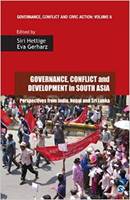 |
Abstract: This volume examines how various forms of governance have emerged in South Asia after colonialism, and the developmental and conflict-related challenges the region faces. Drawing from the contexts of India, Sri Lanka and Nepal, it highlights the degree of institutionalization of democracy. The book further points to the manner in which shortcomings in governmental arrangements intersect with the prevalence of conflict at the national as well as sub-national levels.
|
| 49. Governing Borders and Security: The Politics of Connectivity and Dispersal/ Edited by Catarina Kinnvall and Ted Svensson. Nw York: Routledge, 2014 |
 |
Abstract: This book explores and maps the relationship between borders, security and global governance. Theoretically, the book seeks to establish to what degree, and in what ways, traditional notions of borders, security and (global) governance are being eroded, undermined and contested in the context of a globalizing world. Borders are increasingly being re-conceptualized to account for connectivity as well as divisions at the same time as focus is shifting from permanence to permeability. The ambivalence ascribed to bordering processes is at heart a security concern; borders are not only entwined with state formation but are also attempts at governing securities, identities and histories. |
|
50. Governing the Climate: New Approaches to Rationality, Power and Politics/ Edited by Johannes Stripple and Harriet Bulkeley USA: Cambridge University Press, 2013
|
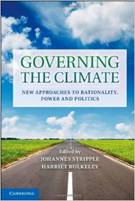 |
Abstract: Despite a growing interest in critical social and political studies of climate change, the field remains fragmented and diffuse. This is the first volume to collect this body of scholarship, providing a key reference point in the growing debate about climate change across the social sciences. The book provides a new set of insights into the ways in which climate change is creating new forms of social order, and the ways in which they are structured through the workings of rationality, power and politics. Governing the Climate is invaluable for three main audiences: social science researchers and advanced students in the field of climate change; the wider research community interested in global environmental politics and global environmental governance; and policy makers and researchers concerned more broadly with environmental politics at international, national and local levels. |
| 51. Governing the Use-of-Force in International Relations: The Post US Challenge on International Law / Aiden Warren, Ingvild Bode.New York: Palgrave Macmillan, 2014 |
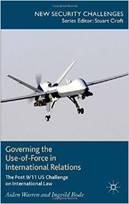 |
Abstract: This book examines US recourse to military force in the post-9/11 era. In particular, it evaluates the extent to which the Bush and Obama administrations viewed legitimizing the greater use-of-force as a necessary solution to thwart the security threat presented by global terrorist networks and WMD proliferation. The Bush administration's use-of-force policy centered on advocating preemptive self-defence options, which were really preventive in nature. For example, it is argued that they responded to potential long-term threats based on ambiguous evidence. Central to this cloaking of preventive options in the more legitimate language of preemptive self-defence was an expanded notion of what counts as an imminent threat. Despite the Obama administration's avowal to multilateralism and professed US adherence to global norms, it did not expressly reject his predecessor's reasoning on the preemptive/preventive use-of-force. |